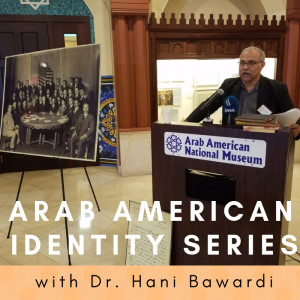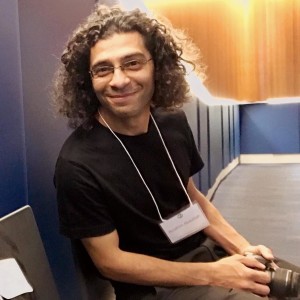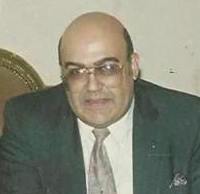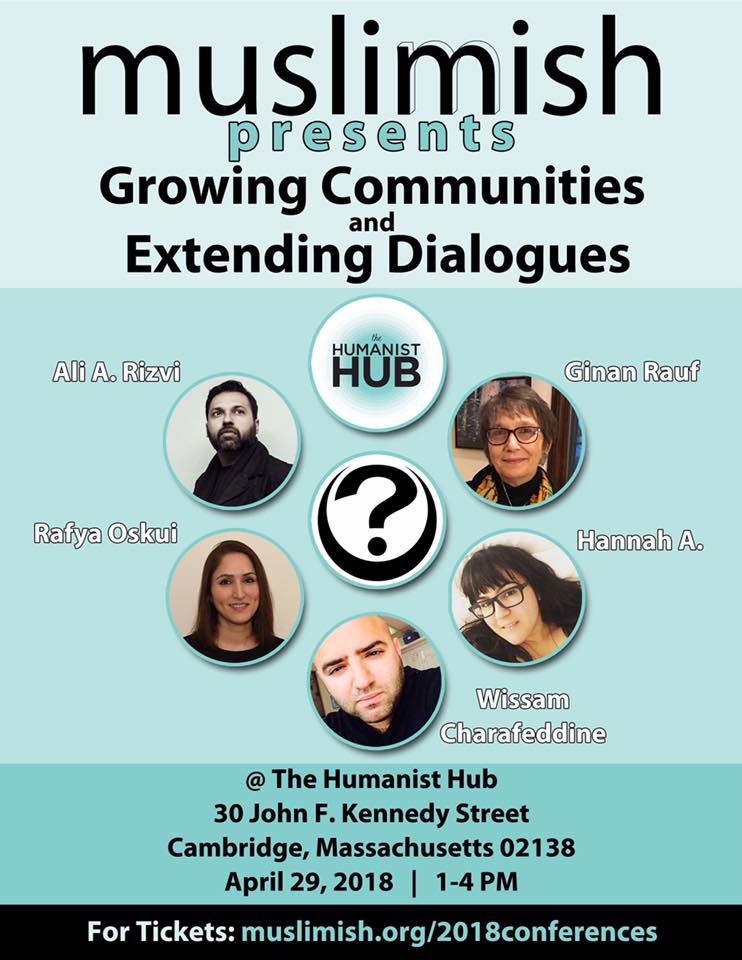Episodes

Friday Apr 12, 2019
Ep. 4: Arab American Identity with Dr. Hani Bawardi
Friday Apr 12, 2019
Friday Apr 12, 2019
Hani Bawardi is Associate Professor of History in the Department of Social Sciences, and principal member of the Center of Arab American Studies at the University of Michigan-Dearborn. He is the author of The Making of Arab Americans: From Syrian Nationalism to U.S. Citizenship. Bawardi has amassed a sizable private collection of manuscripts, and established oral history archives on Arab immigrants from the turn of the nineteenth century at the libraries of University of Michigan, Flint and Dearborn. Bawardi's private papers have the most complete documentation of the activities of four major immigrant political organizations prior to WWII, as well as the personal papers and letters of seminal thinkers and writers including Mikhail Naimy, Hajj Amin al-Husseini, and their contemporaries in the US. Currently, Dr. Bawardi is researching his next book on Arab American advocacy and organizations from 1951 to the present, and editing two Arabic language volumes in preparation for translating them.
Hani J. Bawardi, The Making of Arab Americans: From Syrian Nationalism to U.S. Citizenship (University of Texas Press, 2014). 397 pages.
While conventional wisdom points to the Arab-Israeli War of 1967 as the gateway for the founding of the first Arab American national political organization, such advocacy in fact began with the Syrian nationalist movement, which emerged from immigration trends at the turn of the last century. Bringing this long- neglected history to life, The Making of Arab Americans overturns the notion of an Arab population that was too diverse to share common goals.
Tracing the forgotten histories of the Free Syria Society, the New Syria Party, the Arab National League, and the Institute of Arab American Affairs, the book restores a timely aspect of our understanding of an area (then called Syria) that comprises modern-day Syria, Lebanon, Jordan, Israel, and Palestine. Hani Bawardi examines the numerous Arab American political advocacy organizations that thrived before World War I, showing how they influenced Syrian and Arab nationalism. He further offers an in-depth analysis exploring how World War II helped introduce a new Arab American identity as priorities shifted and the quest for assimilation intensified. In addition, the book enriches our understanding of the years leading to the Cold War by tracing both the Arab National League’s transition to the Institute of Arab American Affairs and new campaigns to enhance mutual understanding between the United States and the Middle East. Illustrated with a wealth of previously unpublished photographs, The Making of Arab Americans provides crucial insight for contemporary dialogues.
Conducting the interview, Wissam Charafeddine:
Wissam Charafeddine was born in the United Arab Emirates to Lebanese parents. He attended the Islamic Hanbaly Educational Institute and graduated with a diploma in Islamic Shariah. After the first gulf war, his family emigrated to the U.S. and he became an American citizen in 2004. During his academic studies, Wissam continued to study and give lectures on Islamic Shariah through distant-study programs in Iran, and with local scholars.
In 2008-2009, while researching in order to write an article about Islam and evolution, Wissam found a new understanding of science, and adapted a new understanding of life based on it. The article was never finished, but a new intellectual journey had begun.
Mr. Charafeddine co-founded Muslimish in 2012 in order to create an environment for support and dialogue among ex-Muslims and questioning Muslims, and fight for the freedom of expression against blasphemy laws in Islamic countries. In his free time, Wissam enjoys sailing, poetry, reading, music, and traveling with his 2 daughters and son.
Email Wissam at: wissam@muslimish.org

Wednesday Mar 13, 2019
Ep3: Arab American Identity with Dr. Hani Bawardi
Wednesday Mar 13, 2019
Wednesday Mar 13, 2019
Hani Bawardi is Associate Professor of History in the Department of Social Sciences, and principal member of the Center of Arab American Studies at the University of Michigan-Dearborn. He is the author of The Making of Arab Americans: From Syrian Nationalism to U.S. Citizenship. Bawardi has amassed a sizable private collection of manuscripts, and established oral history archives on Arab immigrants from the turn of the nineteenth century at the libraries of University of Michigan, Flint and Dearborn. Bawardi's private papers have the most complete documentation of the activities of four major immigrant political organizations prior to WWII, as well as the personal papers and letters of seminal thinkers and writers including Mikhail Naimy, Hajj Amin al-Husseini, and their contemporaries in the US. Currently, Dr. Bawardi is researching his next book on Arab American advocacy and organizations from 1951 to the present, and editing two Arabic language volumes in preparation for translating them.
Hani J. Bawardi, The Making of Arab Americans: From Syrian Nationalism to U.S. Citizenship (University of Texas Press, 2014). 397 pages.
While conventional wisdom points to the Arab-Israeli War of 1967 as the gateway for the founding of the first Arab American national political organization, such advocacy in fact began with the Syrian nationalist movement, which emerged from immigration trends at the turn of the last century. Bringing this long- neglected history to life, The Making of Arab Americans overturns the notion of an Arab population that was too diverse to share common goals.
Tracing the forgotten histories of the Free Syria Society, the New Syria Party, the Arab National League, and the Institute of Arab American Affairs, the book restores a timely aspect of our understanding of an area (then called Syria) that comprises modern-day Syria, Lebanon, Jordan, Israel, and Palestine. Hani Bawardi examines the numerous Arab American political advocacy organizations that thrived before World War I, showing how they influenced Syrian and Arab nationalism. He further offers an in-depth analysis exploring how World War II helped introduce a new Arab American identity as priorities shifted and the quest for assimilation intensified. In addition, the book enriches our understanding of the years leading to the Cold War by tracing both the Arab National League’s transition to the Institute of Arab American Affairs and new campaigns to enhance mutual understanding between the United States and the Middle East. Illustrated with a wealth of previously unpublished photographs, The Making of Arab Americans provides crucial insight for contemporary dialogues.
Conducting the interview, Wissam Charafeddine:
Wissam Charafeddine was born in the United Arab Emirates to Lebanese parents. He attended the Islamic Hanbaly Educational Institute and graduated with a diploma in Islamic Shariah. After the first gulf war, his family emigrated to the U.S. and he became an American citizen in 2004. During his academic studies, Wissam continued to study and give lectures on Islamic Shariah through distant-study programs in Iran, and with local scholars.
In 2008-2009, while researching in order to write an article about Islam and evolution, Wissam found a new understanding of science, and adapted a new understanding of life based on it. The article was never finished, but a new intellectual journey had begun.
Mr. Charafeddine co-founded Muslimish in 2012 in order to create an environment for support and dialogue among ex-Muslims and questioning Muslims, and fight for the freedom of expression against blasphemy laws in Islamic countries. In his free time, Wissam enjoys sailing, poetry, reading, music, and traveling with his 2 daughters and son.
Email Wissam at: wissam@muslimish.org

Wednesday Mar 06, 2019
Ep 2: Arab American Identity with Dr. Hani Bawardi
Wednesday Mar 06, 2019
Wednesday Mar 06, 2019
Hani Bawardi is Associate Professor of History in the Department of Social Sciences, and principal member of the Center of Arab American Studies at the University of Michigan-Dearborn. He is the author of The Making of Arab Americans: From Syrian Nationalism to U.S. Citizenship. Bawardi has amassed a sizable private collection of manuscripts, and established oral history archives on Arab immigrants from the turn of the nineteenth century at the libraries of University of Michigan, Flint and Dearborn. Bawardi's private papers have the most complete documentation of the activities of four major immigrant political organizations prior to WWII, as well as the personal papers and letters of seminal thinkers and writers including Mikhail Naimy, Hajj Amin al-Husseini, and their contemporaries in the US. Currently, Dr. Bawardi is researching his next book on Arab American advocacy and organizations from 1951 to the present, and editing two Arabic language volumes in preparation for translating them.
Hani J. Bawardi, The Making of Arab Americans: From Syrian Nationalism to U.S. Citizenship (University of Texas Press, 2014). 397 pages.
While conventional wisdom points to the Arab-Israeli War of 1967 as the gateway for the founding of the first Arab American national political organization, such advocacy in fact began with the Syrian nationalist movement, which emerged from immigration trends at the turn of the last century. Bringing this long- neglected history to life, The Making of Arab Americans overturns the notion of an Arab population that was too diverse to share common goals.
Tracing the forgotten histories of the Free Syria Society, the New Syria Party, the Arab National League, and the Institute of Arab American Affairs, the book restores a timely aspect of our understanding of an area (then called Syria) that comprises modern-day Syria, Lebanon, Jordan, Israel, and Palestine. Hani Bawardi examines the numerous Arab American political advocacy organizations that thrived before World War I, showing how they influenced Syrian and Arab nationalism. He further offers an in-depth analysis exploring how World War II helped introduce a new Arab American identity as priorities shifted and the quest for assimilation intensified. In addition, the book enriches our understanding of the years leading to the Cold War by tracing both the Arab National League’s transition to the Institute of Arab American Affairs and new campaigns to enhance mutual understanding between the United States and the Middle East. Illustrated with a wealth of previously unpublished photographs, The Making of Arab Americans provides crucial insight for contemporary dialogues.
Conducting the interview, Wissam Charafeddine:
Wissam Charafeddine was born in the United Arab Emirates to Lebanese parents. He attended the Islamic Hanbaly Educational Institute and graduated with a diploma in Islamic Shariah. After the first gulf war, his family emigrated to the U.S. and he became an American citizen in 2004. During his academic studies, Wissam continued to study and give lectures on Islamic Shariah through distant-study programs in Iran, and with local scholars.
In 2008-2009, while researching in order to write an article about Islam and evolution, Wissam found a new understanding of science, and adapted a new understanding of life based on it. The article was never finished, but a new intellectual journey had begun.
Mr. Charafeddine co-founded Muslimish in 2012 in order to create an environment for support and dialogue among ex-Muslims and questioning Muslims, and fight for the freedom of expression against blasphemy laws in Islamic countries. In his free time, Wissam enjoys sailing, poetry, reading, music, and traveling with his 2 daughters and son.
Email Wissam at: wissam@muslimish.org

Wednesday Feb 13, 2019
Arab American Identity with Dr. Hani Bawardi - Eps. 1
Wednesday Feb 13, 2019
Wednesday Feb 13, 2019
Hani Bawardi is Associate Professor of History in the Department of Social Sciences, and principal member of the Center of Arab American Studies at the University of Michigan-Dearborn. He is the author of The Making of Arab Americans: From Syrian Nationalism to U.S. Citizenship. Bawardi has amassed a sizable private collection of manuscripts, and established oral history archives on Arab immigrants from the turn of the nineteenth century at the libraries of University of Michigan, Flint and Dearborn. Bawardi's private papers have the most complete documentation of the activities of four major immigrant political organizations prior to WWII, as well as the personal papers and letters of seminal thinkers and writers including Mikhail Naimy, Hajj Amin al-Husseini, and their contemporaries in the US. Currently, Dr. Bawardi is researching his next book on Arab American advocacy and organizations from 1951 to the present, and editing two Arabic language volumes in preparation for translating them.
Hani J. Bawardi, The Making of Arab Americans: From Syrian Nationalism to U.S. Citizenship (University of Texas Press, 2014). 397 pages.
While conventional wisdom points to the Arab-Israeli War of 1967 as the gateway for the founding of the first Arab American national political organization, such advocacy in fact began with the Syrian nationalist movement, which emerged from immigration trends at the turn of the last century. Bringing this long- neglected history to life, The Making of Arab Americans overturns the notion of an Arab population that was too diverse to share common goals.
Tracing the forgotten histories of the Free Syria Society, the New Syria Party, the Arab National League, and the Institute of Arab American Affairs, the book restores a timely aspect of our understanding of an area (then called Syria) that comprises modern-day Syria, Lebanon, Jordan, Israel, and Palestine. Hani Bawardi examines the numerous Arab American political advocacy organizations that thrived before World War I, showing how they influenced Syrian and Arab nationalism. He further offers an in-depth analysis exploring how World War II helped introduce a new Arab American identity as priorities shifted and the quest for assimilation intensified. In addition, the book enriches our understanding of the years leading to the Cold War by tracing both the Arab National League’s transition to the Institute of Arab American Affairs and new campaigns to enhance mutual understanding between the United States and the Middle East. Illustrated with a wealth of previously unpublished photographs, The Making of Arab Americans provides crucial insight for contemporary dialogues.
Conducting the interview, Wissam Charafeddine:
Wissam Charafeddine was born in the United Arab Emirates to Lebanese parents. He attended the Islamic Hanbaly Educational Institute and graduated with a diploma in Islamic Shariah. After the first gulf war, his family emigrated to the U.S. and he became an American citizen in 2004. During his academic studies, Wissam continued to study and give lectures on Islamic Shariah through distant-study programs in Iran, and with local scholars.
In 2008-2009, while researching in order to write an article about Islam and evolution, Wissam found a new understanding of science, and adapted a new understanding of life based on it. The article was never finished, but a new intellectual journey had begun.
Mr. Charafeddine co-founded Muslimish in 2012 in order to create an environment for support and dialogue among ex-Muslims and questioning Muslims, and fight for the freedom of expression against blasphemy laws in Islamic countries. In his free time, Wissam enjoys sailing, poetry, reading, music, and traveling with his 2 daughters and son.
Email Wissam at: wissam@muslimish.org
![Muslimish Detroit Conference 2018: Muslims in Dearborn: A Pedagogical Approach [English Section]](https://pbcdn1.podbean.com/imglogo/ep-logo/pbblog2260608/44948366_10156551888621578_5848222753806614528_o_300x300.jpg)
Monday Oct 29, 2018
Monday Oct 29, 2018
MC: Dr. Adnan Jaber, PhD Psychology, Public Relations Officer of Muslimish
2:00PM "All-American Muslim" And The Politics Of The Muslim Identity
by Fatima Ayoub-Salemassi, EdD Student, Educator, Muslimish City Organizer,
2:30PM Interacting With The Community: Expectation Of The Secular
by Dr. Youssef Abbas, PhD Engineering
3:00PM True to self and identity
by Siham Jaafar, Founder of Images and Perceptions Diversity Conference
3:30PM Using pedagogy to edify, rectify, transform, reform, predict, and serve
by Imam Dr. Salie Achmat, Imam, PhD Business Leadership, Director of Islamic Studies
4:00PM Learning in Community: Towards a Humanist Pedagogy
by Dr. Ginan Rauf, PhD Comparative Literature, Muslimish VP & Board of Directors
4:30PM Panel Discussion
![Muslimish Detroit Conference 2018 - Muslims In Dearborn: A Pedagogical Approach [Arabic Section]](https://pbcdn1.podbean.com/imglogo/ep-logo/pbblog2260608/45070747_10156551807171578_3676526682941947904_o_300x300.jpg)
Monday Oct 29, 2018
Monday Oct 29, 2018
MC: Wissam Charafeddine, MS Engineering, Educator, Entrepreneur, Activist - Cofounder & BOD Member of Muslimish, IRSHAD, and AACCA. Founder of W Institute
10:00AM Dearborn and Lebanon neighborhoods: The language of people
by Abbas Al Haj Ahmad, MS Physics, Educator, Activist, Writer
10:30AM Challenges of teaching Arabic: The role of immigration and religion
by Dr. Hassan Bazzi, PhD Arabic, Professor, Researcher/Author, Community Organizer
11:00AM Religious thought and practices of Muslim immigrants to Dearborn
by Mr. Aoun Jaber, MS Near Eastern Studies, MS Bilingual Studies, Professor, Entrepreneur, Community Organizer
11:30AM Problematics of Lebanese in Dearborn: The virtue of Recognition & The Vice of Breakdown
by Ambassador Dr. Ali Ajami, PhD Arabic, Author, Diplomat, Cofounder and President of
the Arab American Center for Culture and Arts, Community Organizer
12:00AM Muslims and Vision of Modernity
by Mr. Mustapha Alomari, Author of The Problem of Religion in Social Customization
12:30AM Panel Discussion

Tuesday Sep 11, 2018
History of Muslimish with Ibrahim Abdallah
Tuesday Sep 11, 2018
Tuesday Sep 11, 2018
Ibrahim Abdallah, founder of Muslimish, shares the story of the inception of Muslimish, how it developed its name, and how it became a rare space offering discussion and connection among freethinkers of Muslim backgrounds.
This episode was recorded on June 8, 2018.
Resources discussed in this episode:
Twenty Three Years: A Study of the Prophetic Career of Mohammad by Ali Dashti
The Atheist Muslim by Ali Rizvi
____________________________________________
Interested in hearing more? You can support us in creating more episodes, inviting more guests, and including creative content by visiting our Patreon page here.
MUSLIMISH is a 501(c)(3) non-profit organization with the mission of creating a safe, supportive, and open-minded environment for the exchange of thoughts and ideas among current and former Muslims, fostering a pluralistic society that respects the rights of all individuals to live according to their conscience, and striving to abolish blasphemy and apostasy laws across the globe.
Support Muslimish today muslimish.org/donate

Friday Jul 27, 2018
Friday Jul 27, 2018
Egypt, like most of the Muslim world, has faced great upheaval and change from the 20th century onwards. In this episode, Muslimish is joined by academic expert on Islamism, Dr. Ana Soage, who is intimately familiar with this history. She discusses the rise of Islamist groups in Egypt and focuses on the counter-Islamist Farag Foda. A secular Egyptian thinker and writer, Foda took on the Islamists in Egypt and was assassinated 26 years ago by the group al Gam'ayya al Islamiyya. This episode provides historical context of Egypt’s current state of affairs and potential ways forward by looking back at intellectuals like Foda.
Ana Belén Soage is currently based in Madrid, where she teaches Politics of the Middle East at Suffolk University. She also serves as a Senior Analyst in Wikistrat's analytic community. Dr. Soage holds a Ph.D. in Middle Eastern Studies. She has studied and worked in several Western European and Arab countries and is fluent in Spanish, English, Arabic and French. Dr. Soage has published multiple articles, book reviews and book chapters on issues related to Political Islam, both in the Muslim world and in the West, and International Relations with a focus on the Middle East. In addition, she is a member of the editorial board of Politics, Religion & Ideology and Religion Compass.
This episode was recorded on June 13, 2018.
____________________________________________
Interested in hearing more? You can support us in creating more episodes, inviting more guests, and including creative content by visiting our Patreon page here.
MUSLIMISH is a 501(c)(3) non-profit organization with the mission of creating a safe, supportive, and open-minded environment for the exchange of thoughts and ideas among current and former Muslims, fostering a pluralistic society that respects the rights of all individuals to live according to their conscience, and striving to abolish blasphemy and apostasy laws across the globe.
Support Muslimish today muslimish.org/donate

Tuesday May 15, 2018
Tuesday May 15, 2018
Muslimish: Growing Communities and Extending Dialogues
Speakers
 Ali Rizvi is the award-winning author of the book, The Atheist Muslim: A Journey from Religion to Reason (St. Martin’s Press, 2016). Ali grew up in Libya, Saudi Arabia, and Pakistan, as part of a progressive Muslim family, before he moved permanently to Canada in his twenties. As a physician, he trained in pathology (with fellowship in oncologic pathology) at SUNY Buffalo and the Roswell Park Cancer Institute, and also holds a master of science degree in biochemistry from McMaster University. In 2011, he switched his career to medical communications so he could focus more on his writing. Ali is an avid and vocal advocate for secularism, science, and reform, particularly in the Muslim community. He has been featured on CNN, in The New York Times, The Atlantic, Vox, The Huffington Post, CBC, BBC, the New York Post, and a range of other major media outlets. The Atheist Muslim won the 2016 Morris D. Forkosch Award for Best Book from the Center for Inquiry. Link to longer bio: www.TheAtheistMuslim.com
Ali Rizvi is the award-winning author of the book, The Atheist Muslim: A Journey from Religion to Reason (St. Martin’s Press, 2016). Ali grew up in Libya, Saudi Arabia, and Pakistan, as part of a progressive Muslim family, before he moved permanently to Canada in his twenties. As a physician, he trained in pathology (with fellowship in oncologic pathology) at SUNY Buffalo and the Roswell Park Cancer Institute, and also holds a master of science degree in biochemistry from McMaster University. In 2011, he switched his career to medical communications so he could focus more on his writing. Ali is an avid and vocal advocate for secularism, science, and reform, particularly in the Muslim community. He has been featured on CNN, in The New York Times, The Atlantic, Vox, The Huffington Post, CBC, BBC, the New York Post, and a range of other major media outlets. The Atheist Muslim won the 2016 Morris D. Forkosch Award for Best Book from the Center for Inquiry. Link to longer bio: www.TheAtheistMuslim.com
 Ginan Rauf is an activist, educator, photographer, oral historian and mother. Rauf received a doctoral degree in comparative literature from Harvard University and a joint MA degree in Near Eastern and Judaic Studies from Brandeis University. Rauf has taught in various institutions of higher learning including Brandeis, Rutgers, University of Connecticut and University of Bridgeport. She is the co-founder- along with her son Sherif Ahmed- of a company called Narrative lives that produces oral histories using various mediums including photo essays, videos and audio recordings. Rauf is a secular humanist and feminist committed to promoting critical thinking and a nuanced knowledge of human cultures.
Ginan Rauf is an activist, educator, photographer, oral historian and mother. Rauf received a doctoral degree in comparative literature from Harvard University and a joint MA degree in Near Eastern and Judaic Studies from Brandeis University. Rauf has taught in various institutions of higher learning including Brandeis, Rutgers, University of Connecticut and University of Bridgeport. She is the co-founder- along with her son Sherif Ahmed- of a company called Narrative lives that produces oral histories using various mediums including photo essays, videos and audio recordings. Rauf is a secular humanist and feminist committed to promoting critical thinking and a nuanced knowledge of human cultures.
 Hannah A. is from Austin, Texas. At UT-Austin she studied Middle Eastern Studies and Religious Studies, then went on to study at seminaries in Iran and Lebanon. She is now completing her Master’s at City College of New York. Hannah grew up Christian and converted to Salafi Islam at 15, then became a Shia Muslim in college. She now teaches at an international high school in Manhattan with a large Muslim population. Hannah is socially and politically active and believes in building bridges across lines of faith and culture.
Hannah A. is from Austin, Texas. At UT-Austin she studied Middle Eastern Studies and Religious Studies, then went on to study at seminaries in Iran and Lebanon. She is now completing her Master’s at City College of New York. Hannah grew up Christian and converted to Salafi Islam at 15, then became a Shia Muslim in college. She now teaches at an international high school in Manhattan with a large Muslim population. Hannah is socially and politically active and believes in building bridges across lines of faith and culture.
 Wissam Charafeddine is the Co-Founder of Muslimish, and an Arab American educator, engineer, and entrepreneur who is also a former Imam and a current Islamic reformer and freethinking secular activist. Mr. Charafeddine co-founded Muslimish in 2012 in order to create an environment for support and dialogue among exMuslims and questioning Muslims, and fight for the freedom of expression and against blasphemy laws in Islamic countries. Mr. Charafeddine works in the field of Educational administration, and he is an entrepreneur, founder and CEO of W Design and Developement, W Institute, and Dearborn Blog. In his free time, he enjoys Sailing, Poetry, reading, music and traveling with his 2 daughters and son.
Wissam Charafeddine is the Co-Founder of Muslimish, and an Arab American educator, engineer, and entrepreneur who is also a former Imam and a current Islamic reformer and freethinking secular activist. Mr. Charafeddine co-founded Muslimish in 2012 in order to create an environment for support and dialogue among exMuslims and questioning Muslims, and fight for the freedom of expression and against blasphemy laws in Islamic countries. Mr. Charafeddine works in the field of Educational administration, and he is an entrepreneur, founder and CEO of W Design and Developement, W Institute, and Dearborn Blog. In his free time, he enjoys Sailing, Poetry, reading, music and traveling with his 2 daughters and son.
 Rafya Oskui is a Muslimish co-organizer, business owner, and healthcare professional. A Pakistani American, Rafya is also a women’s rights activist, a mother, and a change maker.
Rafya Oskui is a Muslimish co-organizer, business owner, and healthcare professional. A Pakistani American, Rafya is also a women’s rights activist, a mother, and a change maker.

Tuesday May 01, 2018
Tuesday May 01, 2018
Speakers
 Ali Rizvi is the award-winning author of the book, The Atheist Muslim: A Journey from Religion to Reason (St. Martin’s Press, 2016). Ali grew up in Libya, Saudi Arabia, and Pakistan, as part of a progressive Muslim family, before he moved permanently to Canada in his twenties. As a physician, he trained in pathology (with fellowship in oncologic pathology) at SUNY Buffalo and the Roswell Park Cancer Institute, and also holds a master of science degree in biochemistry from McMaster University. In 2011, he switched his career to medical communications so he could focus more on his writing. Ali is an avid and vocal advocate for secularism, science, and reform, particularly in the Muslim community. He has been featured on CNN, in The New York Times, The Atlantic, Vox, The Huffington Post, CBC, BBC, the New York Post, and a range of other major media outlets. The Atheist Muslim won the 2016 Morris D. Forkosch Award for Best Book from the Center for Inquiry. Link to longer bio: www.TheAtheistMuslim.com
Ali Rizvi is the award-winning author of the book, The Atheist Muslim: A Journey from Religion to Reason (St. Martin’s Press, 2016). Ali grew up in Libya, Saudi Arabia, and Pakistan, as part of a progressive Muslim family, before he moved permanently to Canada in his twenties. As a physician, he trained in pathology (with fellowship in oncologic pathology) at SUNY Buffalo and the Roswell Park Cancer Institute, and also holds a master of science degree in biochemistry from McMaster University. In 2011, he switched his career to medical communications so he could focus more on his writing. Ali is an avid and vocal advocate for secularism, science, and reform, particularly in the Muslim community. He has been featured on CNN, in The New York Times, The Atlantic, Vox, The Huffington Post, CBC, BBC, the New York Post, and a range of other major media outlets. The Atheist Muslim won the 2016 Morris D. Forkosch Award for Best Book from the Center for Inquiry. Link to longer bio: www.TheAtheistMuslim.com
 Ginan Rauf is an activist, educator, photographer, oral historian and mother. Rauf received a doctoral degree in comparative literature from Harvard University and a joint MA degree in Near Eastern and Judaic Studies from Brandeis University. Rauf has taught in various institutions of higher learning including Brandeis, Rutgers, University of Connecticut and University of Bridgeport. She is the co-founder- along with her son Sherif Ahmed- of a company called Narrative lives that produces oral histories using various mediums including photo essays, videos and audio recordings. Rauf is a secular humanist and feminist committed to promoting critical thinking and a nuanced knowledge of human cultures.
Ginan Rauf is an activist, educator, photographer, oral historian and mother. Rauf received a doctoral degree in comparative literature from Harvard University and a joint MA degree in Near Eastern and Judaic Studies from Brandeis University. Rauf has taught in various institutions of higher learning including Brandeis, Rutgers, University of Connecticut and University of Bridgeport. She is the co-founder- along with her son Sherif Ahmed- of a company called Narrative lives that produces oral histories using various mediums including photo essays, videos and audio recordings. Rauf is a secular humanist and feminist committed to promoting critical thinking and a nuanced knowledge of human cultures.
 Hannah A. is from Austin, Texas. At UT-Austin she studied Middle Eastern Studies and Religious Studies, then went on to study at seminaries in Iran and Lebanon. She is now completing her Master’s at City College of New York. Hannah grew up Christian and converted to Salafi Islam at 15, then became a Shia Muslim in college. She now teaches at an international high school in Manhattan with a large Muslim population. Hannah is socially and politically active and believes in building bridges across lines of faith and culture.
Hannah A. is from Austin, Texas. At UT-Austin she studied Middle Eastern Studies and Religious Studies, then went on to study at seminaries in Iran and Lebanon. She is now completing her Master’s at City College of New York. Hannah grew up Christian and converted to Salafi Islam at 15, then became a Shia Muslim in college. She now teaches at an international high school in Manhattan with a large Muslim population. Hannah is socially and politically active and believes in building bridges across lines of faith and culture.
 Wissam Charafeddine is the Co-Founder of Muslimish, and an Arab American educator, engineer, and entrepreneur who is also a former Imam and a current Islamic reformer and freethinking secular activist. Mr. Charafeddine co-founded Muslimish in 2012 in order to create an environment for support and dialogue among exMuslims and questioning Muslims, and fight for the freedom of expression and against blasphemy laws in Islamic countries. Mr. Charafeddine works in the field of Educational administration, and he is an entrepreneur, founder and CEO of W Design and Developement, W Institute, and Dearborn Blog. In his free time, he enjoys Sailing, Poetry, reading, music and traveling with his 2 daughters and son.
Wissam Charafeddine is the Co-Founder of Muslimish, and an Arab American educator, engineer, and entrepreneur who is also a former Imam and a current Islamic reformer and freethinking secular activist. Mr. Charafeddine co-founded Muslimish in 2012 in order to create an environment for support and dialogue among exMuslims and questioning Muslims, and fight for the freedom of expression and against blasphemy laws in Islamic countries. Mr. Charafeddine works in the field of Educational administration, and he is an entrepreneur, founder and CEO of W Design and Developement, W Institute, and Dearborn Blog. In his free time, he enjoys Sailing, Poetry, reading, music and traveling with his 2 daughters and son.
 Rafya Oskui is a Muslimish co-organizer, business owner, and healthcare professional. A Pakistani American, Rafya is also a women’s rights activist, a mother, and a change maker.
Rafya Oskui is a Muslimish co-organizer, business owner, and healthcare professional. A Pakistani American, Rafya is also a women’s rights activist, a mother, and a change maker.

